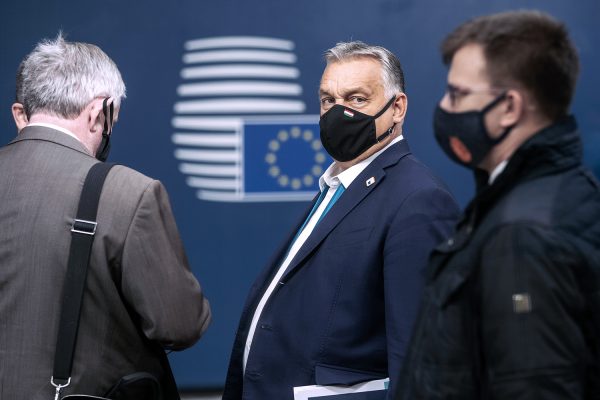
For too long has the European Union tolerated the formation of a self-proclaimed “illiberal democracy” in its midst. A recent European Court of Justice ruling underscores that Hungary is not only in beach of the rule of law, but violates the very rights and values on which the EU is founded.
The court ruled earlier this month that restrictions imposed on foreign universities — which forced the George Soros-funded Central European University to relocate from Budapest to Vienna — were “incompatible” with the EU’s Charter of Fundamental Rights.
Gwendoline Delbos-Corfield, a French member of the European Parliament and its rapporteur on the situation in Hungary, commented that the ruling “should send a warning to Viktor Orbán: that it’s time to step back from the brink of autocracy and reverse the Hungarian government’s undemocratic path.”
Orbán, prime minister since 2010, has come a long way. He started his political career as a liberal anticommunist and ended up the most right-wing, authoritarian government leader in the EU.
If the rest of the bloc is to rein him in, it must first understand how he has been able to gain, and keep, his power.
This is Viktor Orbán’s authoritarian playbook.
Scapegoat minorities
Like most strongmen, Orbán scapegoats minorities in order to draw the public’s attention away from real problems. In Orbán’s case, migrants and refugees, especially if they are from Muslim countries.
In 2011, Orbán stripped more than 300 religious groups and organizations of their legal status overnight, depriving them of state subsidies. Only fourteen faiths retained their official recognition. The church law was deemed discriminatory by Hungary’s own Constitutional Court as well as the European Court of Human Rights. Two Islamic organizations were later added to the official list, and the government amended the law in 2018, but it still privileges Christian churches.
Hungary is secular in name, but Orbán regularly invokes “Christian” values to justify his policies. He argues that Muslims are trying to “conquer Europe through faith” and that “Hungarians should not want to live together with Muslims.”
In 2015, Orbán cited the European refugee crisis to justify giving police the power to conduct searches without a warrant and collect bulk phone data.
Later that year, following the attack on Charlie Hebdo in Paris, Orbán could not have been clearer, saying:
We do not want to see significantly sized minorities with different cultural characteristics and backgrounds among us.
Undermine the judiciary
Modern-day autocrats rely on wide-ranging executive powers while weakening other branches of government.
Orbán gerrymandered seats in parliament, so his party could win a two-thirds majority needed to change the Constitution with under 45 percent of the votes. He then set his sights on the judiciary.
Constitutional amendments enacted in 2013 — and criticized by the EU, the United States and human rights groups — annulled previous Constitutional Court rulings and barred the court from overturning laws that had the support of two-thirds of lawmakers.
After winning reelection in 2018, Orbán created a separate, administrative court system for issues related to asylum, elections and police violence, with judges handpicked by Orbán’s justice minister.
Several judges inexplicably resigned from the independent National Judicial Council before it was due to announce the result of an inquiry into allegations that Tünde Handó, an Orbán loyalist, had packed the courts in her capacity as chief of the judiciary. Orbán elevated her to the Constitutional Court a year later.
According to Cas Mudde, a University of Georgia professor who is an expert on right-wing populism, the constitutional amendments completed Hungary’s transition from a liberal democracy to a “competitive authoritarian regime”. He told The New York Times:
With the government also in full control of the elections, with no independent judiciary oversight, we can no longer pretend elections will be even remotely free and fair.
This year, Orbán went so far as to sideline parliament altogether and suspend all elections, indefinitely, citing the coronavirus pandemic. He gave up this emergency power after ruling by decree for two months, but some measures remain in place, including a 50-percent cut in subsidies for political parties and fines for unsanctioned protests.
Control the media
The final ingredient of Orbán’s autocracy is control and manipulation of the news media.
One of the first things Orbán did after coming to power in 2010 was smother the voices of critics. A new media law ordered outlets to register with a media control body, whose members were appointed by parliament. The panel can impose fines of up to €1 million for “imbalanced news coverage”. News programs are not allowed to devote more than 20 percent of their airtime to crime stories. Journalists have been stripped of legal protection to keep their sources confidential.
The law was widely condemned, including by the European Parliament. It had little effect. Orbán’s government systematically dismantled the free press. The state pulled advertising from critical outlets, depriving them of income. Népszabadság, the biggest independent newspaper, was forced to shut down in 2016. Hundreds of private news media were simultaneously donated to a single holding company run by Orbán’s friends in 2018. Orbán barred regulators from scrutinizing the transaction, arguing it was in the “national interest”.
Earlier this year, the editor of one of Hungary’s few remaining independent news websites, Index, was fired after an Orbán ally acquired a 50-percent stake in the company.
Citing the pandemic again, Orbán has criminalized the spread of “false” and “distorted” information about the coronavirus that might “alarm” the public — including coverage that would expose how Hungary’s incessant administrative upheaval crippled its public health system.
